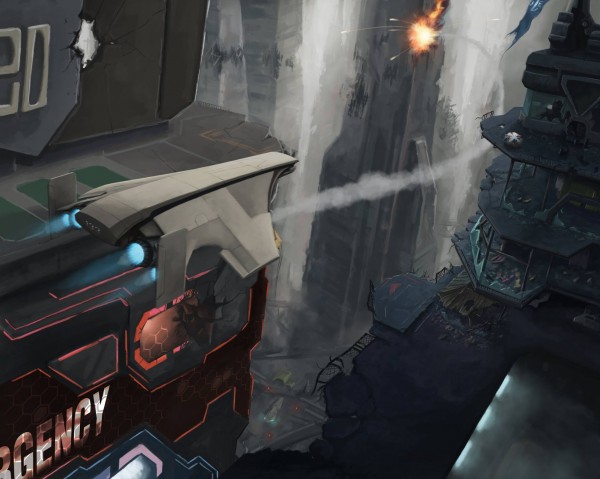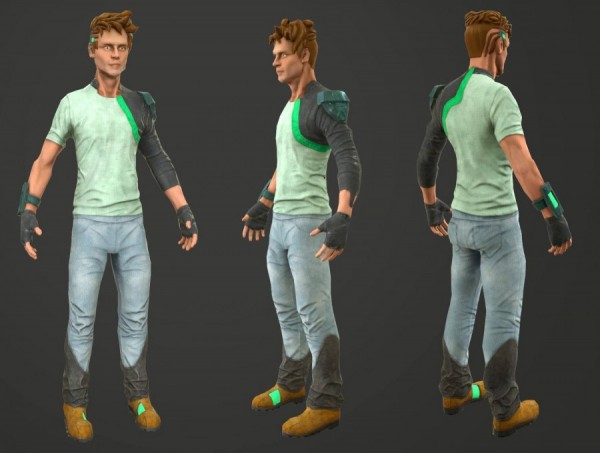This article was written by @VGR_Reviews
Hello Justin! Do you mind quickly introducing yourself?
Hi Nathan! Thanks for giving me the chance to introduce myself and INT. My name is Justin and I am the Project Lead for INT. I also teach computer applications full time during the school year, and some of my content includes game design and technology. In addition, I hold a M.A. and am currently working on a second degree. Overall, I believe my skill-sets have helped me manage and design INT thus far in our development.
What is INT, as a basic overview of the game?
INT is at its heart a science-fiction RPG, but includes elements from space westerns, epics, and roguelike games. The game begins with a short demo, or prologue, from the planet Bastion. On Bastion you will be introduced to many of our game’s features, which include: randomized companions, building layouts, boss battles, and dynamic storytelling.
Following Bastion, you will gain a starship, explore the far reaches of space, acquire longstanding mission contacts, partake in the main story arc or choose to sidestep it in favor of Wild Space. Wild Space is a randomized series of quadrants with interactive challenges and missions each time you play it. The player can also choose to complete both the main story arc as well as venture into Wild Space. Throughout the game you will acquire loot, level up through skill trees in our sandbox leveling system, and engage in romances with your companions. Each companion will have a character-driven story and exclusive background.
Do you have any idea of when it is going to release, where and for how much? I have heard you’re releasing a demo.
We are aiming to release the demo before January of 2015 and the demo will be a free public release to the community. We will not charge anything for the demo; it is meant to be a gift to our fans and anyone out there who is willing to try out our product. Following the demo, I anticipate a year’s worth of development time to create the main game, INT, but there may be free content packs for the demo released during this period as well. Pricing for the full game has not been determined yet, but I would expect it to be similar in price to other indie releases.
A lot of your work is going into making a detailed story and world. Why is this important to you? How is writing for something of that nature?
It may sound cliché, but story is paramount to the success of any RPG. Creating a detailed universe and story for INT is one of our top priorities next to actually modeling and generating the concept art for building the world. I have always found the most thought out and detailed RPGs to be ones with great stories, so naturally I wanted to bring storytelling to a new level of detail with INT. Not only will you find that all of our pre-set and randomized companions to have a thought out and engaging backstory. Players will find a diverse set of locations, planets, orbital stations, and ships, each with a detailed dossier packed with story. Of course, writing a new intellectual property can be challenging, but I feel confident that our team of writers can overcome any challenge to bring you a fresh, new, universe for your enjoyment in our sci-fi RPG.
What do you think it is about roguelikes and RPGs that draws gamers (and developers) to them?
I believe this question deserves a two-part answer. Roguelikes at their core are difficult games and are meant to be hard yet rewarding. Usually the player is granted one life to live and when you die, its game over. There is also an element of randomization to a roguelike. Usually you play through each game with the expectation of wonder at what you may encounter next while dreading the fact that you may die at any time. This makes each successful play-through all the more rewarding if you succeed. Similarly, RPGs offer you a sense of empowerment the longer you play. The longer you play, the more likely you are to level to a higher rank and acquire greater loot. I think gamers are drawn to both for the reasons stated above and often for storytelling.
While roguelikes may not have the most complex stories, they do usually offer some form of storytelling, whether it is random quests or a simple backstory. Then as the player you get to fill out that backstory and turn it into your story. RPGs offer the same thing, except it is usually much more structured and detailed. As a game designer I can see the benefits of both genres and the pitfalls, and I believe developers as a whole turn to RPGs and roguelikes for storytelling avenues. Both offer excellent ways to share a story, whether it is a de-centralized adventure in which the player creates the story (roguelike) or by a structured story in which the player is empowered throughout to accomplish the tasks and quest at hand (straight RPG).
Is there one thing you want to see changed about the indie games business?
The indie game business has and continues to grow as more and more gamers become dissatisfied with major publishing groups. Gamers, in my opinion, are seeking indie developers because they are not tied to a corporate structure and, for the most part, do not have shareholders that hold them accountable. Indie developers are allowed to make the games that the fans want with no strings attached. That being said, I think the business could be strengthened by additional marketing tools for indie-game developers, because it can be hard to be heard. Additionally, I would like to see greater distribution methods for indie game developers because while it has gotten better over the years I do think there is room for improvement.
Do you have any tips for aspiring developers, in terms of writing and creating a vivid world for their game?
For years I have carried around a binder of notes for different projects that I wanted to start, which ranged from fantasy to modern and finally sci-fi. Part of my problem was nailing down what I wanted to do. Ultimately, you have to pinpoint exactly what you want to tell in your story, plot your goals, and then begin building your world.
When you’re building a complex, multi-layered, story like the one being told in INT, you want to think about the universe in your IP first. Before you even begin writing the story, plot the universe and create a rich back-story. Then sit down and pen your first draft. Also, don’t neglect character development. Each character should allow for development as the story progresses. Finally, be creative when you’re building your world; creativity is perhaps the most important element out of all of this. Clones rarely survive or make for in-depth plays.
Any parting thoughts?
I would just like to thank you, Nathan, for the time and coverage. It can be tough trying to get the attention of interviewers out there, and I am glad you found our story interesting enough to include it on your website IndieGraph. Next, I would like to ask any of your readers who are interested in INT to check us out on the following platforms.
Facebook: Facebook.com
Twitter: Twitter.com
Reddit: Reddit.com
YouTube: Youtube.com
You can read this article on Indiegraph.
Follow Indiegraph on Twitter!



